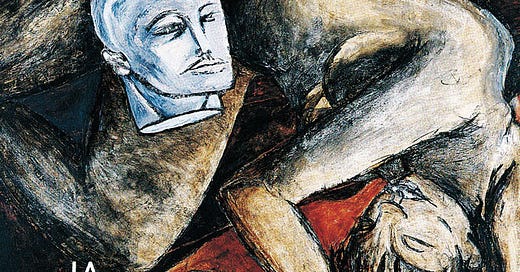Genre of the Day - Chanson alternative
Album of the Day - La marmaille nue (The Naked Brat) by Mano Solo (1993)
EDIT: The pendulum swing I reference in this article came back to bite ME! For factual accuracy, since the time I wrote this article it looks as if a pro-Macron, left-wing coalition will prevail in the snap elections, not the far right coalition as it seemed a couple days ago.
France is in the midst of a major paradigm shift politically. Marine le Pen’s far-right influence inching its way into the zeitgeist for over a decade now has blown up in Macron’s face in the form of the conservative movement’s massive gains in his recent snap elections. Though Macron’s presidential term isn’t up until 2027, these motions seemingly point towards the radical French right’s ascendance to executive power in a matter of a few years.
While the pendulum of French politics swings with rapidity, one unfortunate constant in French political life is the marginalization of the Romani population of France. Constantly forced out of makeshift camps and facing little job opportunity, typically prevailing Euro notions of universalism and tolerance fly out the window in regards to the status of Romanis. In contrast with this marginalization and cultural shunning, one of France’s musical alternative movements set out to differentiate itself from mainline French social ideas by incorporating Romani music, among other ‘outsider’ music. The ‘90s ushered in an era of recalibration for the French cultural sphere, as all-time high Anglosphere infiltration spurred President Jacques Chirac to institute the Toubon Law mandating the use of French in public communications and directing radio stations to ensure that a minimum 35% of songs spun were in French.
Chanson alternative took a parallel yet simultaneously diverging path, doing away with standard western pop instrumentation while developing unique and inclusive ideas of Frenchness with influences from Romani folk music and Romani-influenced jazz, ska, traditional French folk, and Latin and African genres along with unique instrumentation incorporating folk and orchestral instruments. As much as chanson alternative interrogated ideas of Frenchness musically, lyrically its political and humorous skews affirmed its dedication to challenging the zeitgeist and promoting openness, acceptance, and good-old-fashioned French anarchism.
Mano Solo has an apt voice to draw attention; his rough baritone is observant, though his impassioned delivery makes it sound as if the words are being pulled out of him by some higher entity. “Allo Paris” lambasts the typically lauded city, Solo’s exasperation cloaked in a raucous horn extravaganza, with the accordion waltzing of “Sacré Coeur” a companion piece exploring the isolating feeling of lovelorn defeat in a city brimming with wide-eyed tourists. He never sacrifices energy in the name of this moodiness, as in the Romani-derived clapping rhythms and electric guitar of “15 ans du matin” or “La lune[‘s]” Black American gospel-styled breakdown. The album is a sharp and poignant take on his own struggles such as references to his HIV contracted via drug use (“Pas du gâteau”) and the bewildering nature of Parisian life. If chanson alternative is the Parisian alley less-traveled, Mano Solo’s tales are a fantastic entry down that path.
I apologize for a relatively short article: I have to get up at 6:30 AM to watch goats getting milked, and I’ve been enjoying a wonderful time in the mountains with my family so I wouldn't like to tarnish the last day with my usual blogging-derived sleep deprivation. Thank you for reading, I appreciate you!




